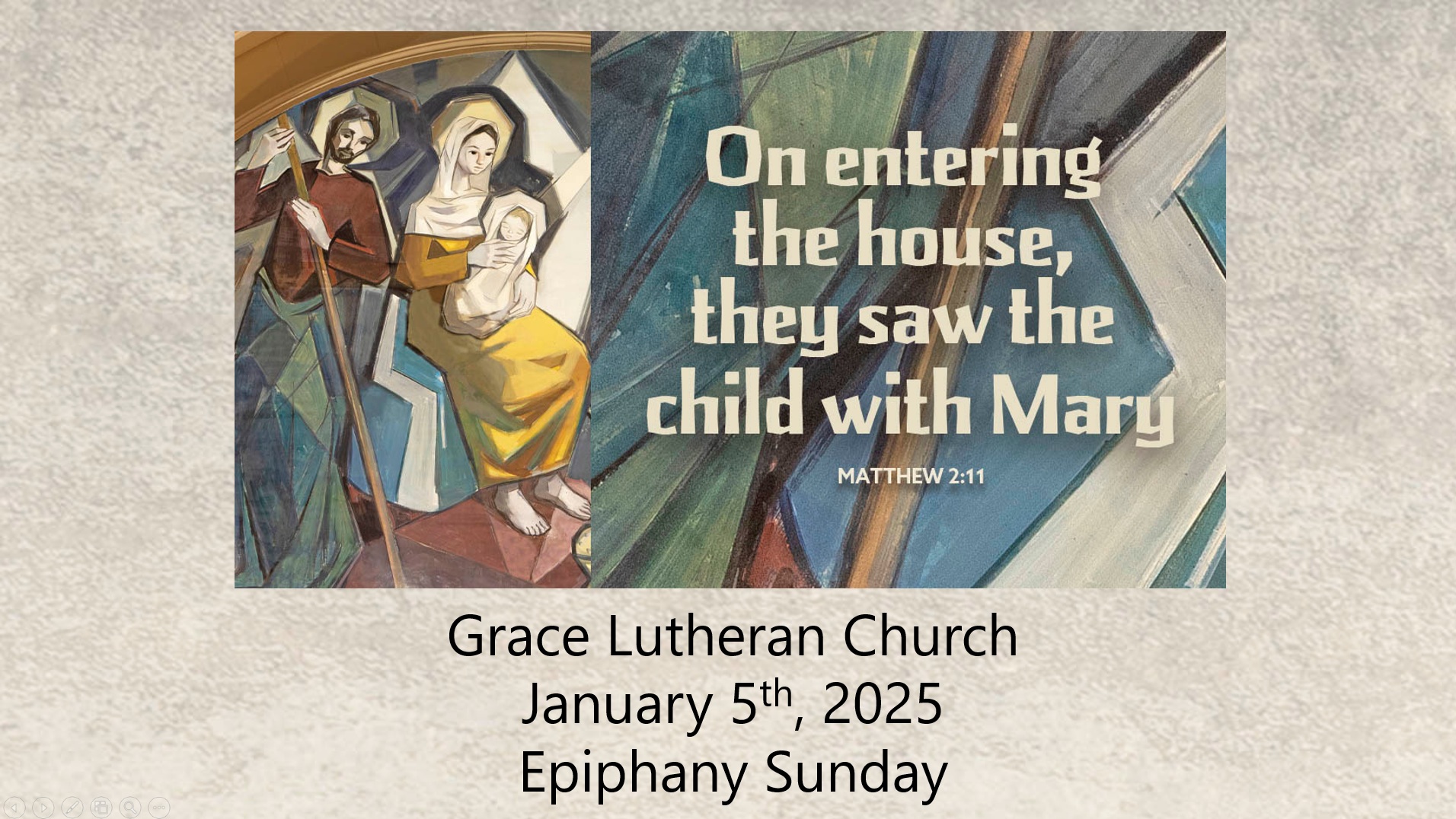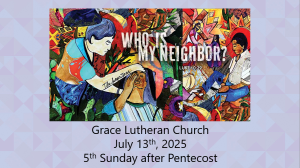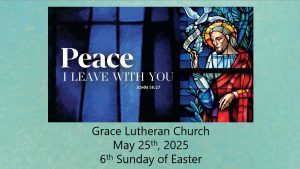Hi everyone,
Welcome to worship for this Epiphany Sunday, January 5, 2024! We realise that this isn’t the actual Day of Epiphany (January 6), but we are celebrating the Epiphany anyway!
The bulletin for this service can be found here. In it, you’ll find the order and words of worship and the full sermon manuscript. You can use the bulletin to follow along with the service or just use the words that will appear on the screen. The sermon manuscript is also included on this page below the worship video.
For an enhanced online worship experience, you are invited to have a candle in your space, lit at the beginning of the service and extinguished near the end after the sending hymn when the altar candles are extinguished. You are also welcome to participate in communion if you are comfortable, by having something small to eat and drink prepared for the appropriate time in the service. Further instruction will be given then.
May God’s liberating truth penetrate your hearts this day and always!
O God, by your Spirit, draw us to your light, your Word, and the hope in your love, Jesus Christ our Lord. Amen.
As I mentioned before, we’re celebrating the Day of Epiphany today when it’s really tomorrow. Just like how Christmas every year is on December 25th, the Day of the Epiphany is always 12 days after that, on January 6th. Today is supposed to be the 2nd Sunday of Christmas, because it lands within that 12 days of Christmas where we get that popular song with the hard to remember lyrics from. Sure, Christmas days 1 to 5 aren’t bad but as soon as you get to the 6th day of Christmas, it all seems to fall apart. Anyway, just to reiterate, today isn’t actually the Day of the Epiphany per se, but it is the Sunday that we’ll be remembering the Epiphany.
I thought recognising the Epiphany was important enough to change the schedule like this for a couple of reasons. The first is that we don’t always get this story of the Magi visiting young Jesus on a Sunday, and so we don’t get the “true” details that are often misrepresented in the other non-12-days-of-Christmas songs like We Three Kings (which we didn’t sing today), and even the 3rd and 5th verses of The First Noel (which we did sing today). I always like to shatter those images that we have from our childhood and literally every single Nativity scene diorama of the 3 Wise Men at the stable when Jesus was born.
Another reason I changed it is because the text for this 2nd Sunday of Christmas is John chapter 1, “In the beginning was the Word, and the Word was with God, and the Word was God” and so on and so forth. We just got that text on Christmas Eve, and while I didn’t preach a sermon on it then, I sure did on Christmas Day, when we got that same text again. So I didn’t want to have you all have to hear yet another sermon on the topic. Nothing against the text at all, but more against my preaching on it. I can only say the same thing so many times.
So, then, here we are, Epiphany.
It’s a day we’ve heard of, of course, as we have this whole season in the church calendar that is based on it… sort of. But it’s not a day that know much about, as it’s not like Christmas or Easter level special for the church as not many people make that extra effort to come out for a mid-week Epiphany service if we were to have one, let alone a non-January 6th Sunday designated to observe the Epiphany. Sure, we might be somewhat familiar with the story that this day revolves around, but like I said, that is mostly from the songs that we sing and not from the actual story that we get in our bibles.
For example, if I were to ask you how many Magi there were, what would you say? When did they first see Jesus? Who even are they to care enough to go?
Very quickly the typical answers would be three, the night he was born, and they were Magi/wise men/kings. And that’s just going by the songs. Tradition in the church over the years goes even further and gives them names, exactly where they came from, and even how long they travelled to get there. Which by the way is 12 days, which again is why we have 12 days of Christmas as well as Epiphany landing on today (I mean tomorrow).
But none of that was even included in the story, was it. No where in today’s reading do we get their names, their quantity, or what their profession actually is. The text is silent on how long it took them to get to see Jesus, how old he was at the time, and even where they’re really from. We don’t even know if they’re kings or not.
Sure, we can make educated guesses. They are called “Magi”, where we get the terms “magic” and “magician” from, which would suggest that they’re mystics of some sort. We hear they like looking at stars so they could be astronomers or even astrologers. We know they travelled from afar with some lavish gifts so they were probably rich. But the fact of the matter is, we just don’t know much about them. Again, that didn’t stop people from making assumptions and writing songs about them, but all we really know is that they were foreigners, they we misled by King Herod, and they brought gifts with them that were fit for the distinguished, the divine, as well as the dead. A strange combination of tributes for a child, you have to admit.
And this is where I wish we did know more about the Magi, rather than just making up arbitrary guesses and putting them to music. Like, what did they hear and know about Jesus? Why were they so interested? And how were they able to distinguish the star they followed against all the other billions of stars out there?
These are all interesting questions that I wish were added to the text that we get. But maybe Matthew not bothering with those details tell us that, while it’d be cool to know, it doesn’t really matter. I mean, these folk of course do matter to their families and communities, but to this story those details that we might be wondering about could just be inconsequential to the point that it’s trying to make.
Like whenever it was that they actually got to Jesus doesn’t matter as much as them actually getting to Jesus. Whatever quantity of them made the journey isn’t as important as these foreigners making the journey at all. Them being kings or not doesn’t change the fact that they encountered the one true King. They may have had to sift through the other kings and powers, but they got there eventually.
So then I wonder if the lesson for this Epiphany is just that, the epiphany of the true King, our realisation of what power in God’s righteousness looks like, our understanding of what it means to be God’s people in the world, and the revelation that this truth isn’t just for us who we consider to be on the inside, but it is for all people of all walks and backgrounds and upbringing.
See this story of God with us isn’t supposed to be only for the select and elite few. This gospel of Jesus isn’t to be hidden behind walls that we think are going to protect and preserve us as we are or what we might think we are. This good news of a baby born to us, showing us true kingship in humility, true strength in graciousness, and true love through service and sacrifice, is for all people.
That can be hard to hear in a world that is so divided. It can be difficult to accept that God doesn’t hate the same people that we do. It’s almost impossible to comprehend such a grace that would love even them. You know who I’m talking about. The outsiders. The marginalized. The less affluent or cultured as we are. The ones different from us.
Or.
Those who disagree with us. Those who don’t see the world the way we see it. Those who threaten and hurt us. Those that we consider to be evil.
God came to the world as a baby for them too. God through the actions of Jesus Christ saves them too. God as a benevolent and gracious God, loves them too. Just as God loves us.
As hard to hear as this might be, it is the truth. It is the truth that drew the Magi westward. It is the truth that Herod decided to reject and unsuccessfully put an end to. It is the truth that shines onto and into all of us, releasing us from the burdens and prejudices of the world, opens our eyes to see the radiance of God that calls us into God’s kingdom, community, and arms of love, and sets us free.
So that begs the question, what will we do with this truth that draws us near to God? We can turn away like Herod and believe that our way is better, our power is for us to keep, and that our enemies and anything that threatens our privilege need to be punished. Or, like the strange and mysterious Magi, we can turn to the truth, look full into the wonderful light, and see the things of this world growing strangely dim in the promise of God’s glory and grace.
When we encounter the living Christ, we are changed. Like the Magi, our paths change. The way we see the world and all that is in it, changes. And that is the point of the Epiphany.
So on this day of the Epiphany, or the day we observe the Epiphany at least, and throughout this upcoming season after the Epiphany and beyond, may our own epiphany match that of the Magi, to see the truth of who Jesus is, who he came to save, and who is welcome in God’s glorious arms of grace. Thanks be to God. Amen.




